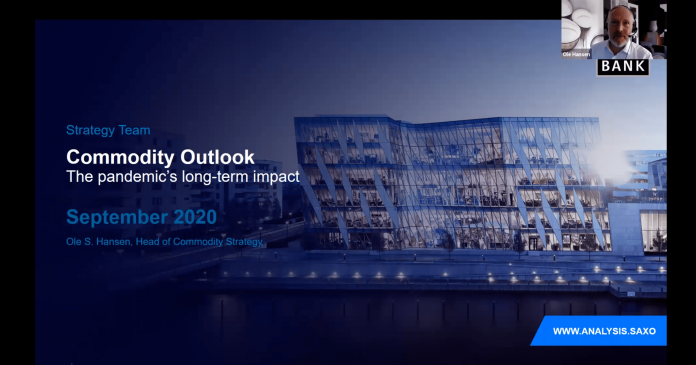With oil prices likely to remain under pressure and a price recovery above $50 per barrel not expected before the end of the year at the earliest, Gulf countries face a challenging few months in balancing their economies, according to Saxo Bank’s Head of Commodity Strategy, Ole Hansen.
Speaking during an online briefing hosted today by Saxo Bank, Hansen highlighted stalling global energy demand affected by Covid-19 travel restrictions, rapidly mounting oil supplies in storage facilities and Saudi Arabia’s reduction in its oil exporting price as the key factors likely to keep the price of oil below US$ 50/barrel until 2021.
“Crude oil has been trading in a fairly stable pattern in the low US$ 40s since June, however we are seeing evidence in data from the physical market that there are risks emerging. Weak refinery margins, caused primarily by the excess of unwanted diesel and jet fuel, are leading to storage facilities rapidly filling up,” said Hansen.
Meanwhile, Saudi Arabia has reduced its official selling prices for exports to Asia, adding fuel to the growing belief that the recovery in global demand is stalling amid new Covid-19 flare-ups around the globe. The reduction in Saudi Arabia’s selling price may also be an attempt to support stronger imports from China as competition for this important customer heats up amid slowing demand. This comes after China’s seaborne crude oil imports in August fell 5.4% month-on-month to 11.3 million barrels per day, still up 13% from a year earlier.
Hansen explained that a dramatic new sell-off in crude oil is not expected, but acceptance needs to be reached that Covid-19 and doubts about the availability of a vaccine may delay a further recovery towards US$ 50 and higher until next year.
“The slowness of the oil price recovery is testing the unity of the OPEC+ group, which arguably increased production before demand had recovered enough to absorb the additional barrels. In addition, the long-term impact of low oil prices and Covid-19’s negative impact on global tourism and business travel will continue to pose challenges for the UAE and other GCC economies,” said Hansen, adding: “OPEC members are eager to see a price recovery because, at US$ 40, oil is roughly half the price that many members, including Saudi Arabia, need for their budgets to stay in the black.”
Hansen expects global energy demand to remain on regional governments’ agendas for some time, with the outlook for energy markets still unclear even when a vaccine puts an end to the pandemic.
“Much depends on how we individually and collectively change behaviour, and how we work in the future,” said Hansen. “It’s entirely possible the pandemic will change the way we live and work in the future, which may negatively impact the consumption of fuel going forward. I expect the new normal will mean fewer domestic and international business meetings, a higher rate of professionals working from home, an uptake in cycling as a form of transport, a substitution of domestic holidays for foreign trips, and a preference for domestic service and goods. These factors will have a meaningful impact on energy demand, and I expect this issue to be a leading focal point in 2021 and beyond,” concluded Hansen.











